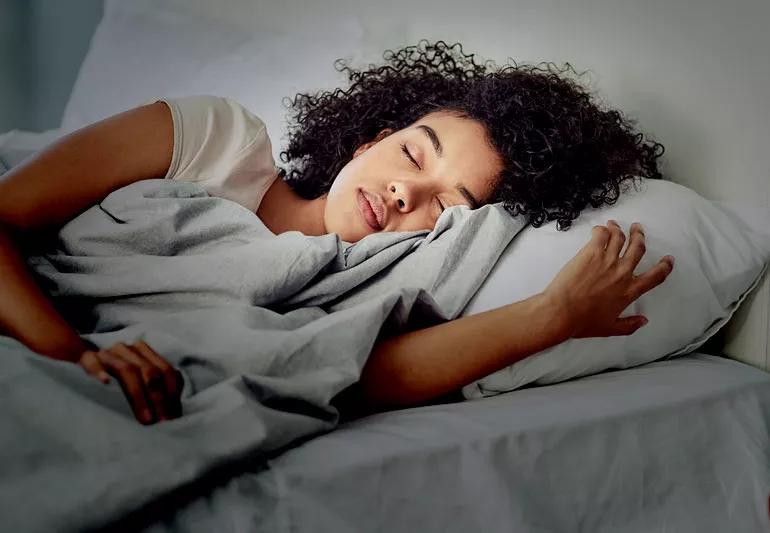What we do and don’t know about sleep talking

Image content: This image is available to view online.
View image online (https://assets.clevelandclinic.org/transform/94e8cec1-28d0-44c3-8c30-2301a8d5d6f6/talkSleep-1217582444-770x533-1_jpg)
woman sleeping in bed
Have you ever woken up in the middle of the night to your spouse, roommate or child mumbling nonsense – or actual sentences – out loud while they sleep? Chances are, when morning rolled around, they had no idea that it even happened.
Advertisement
Cleveland Clinic is a non-profit academic medical center. Advertising on our site helps support our mission. We do not endorse non-Cleveland Clinic products or services. Policy
Or maybe it’s you who’s been known to startle someone else awake with a midnight monologue.
Talking in your sleep (or somniloquy, as it’s known in the medical world), is a common type of parasomnia, or abnormal behavior during sleep. An estimated two in three people talk in their sleep at some point in their lives – and it’s especially common in children.
It can be a little irritating or embarrassing, depending on which side of it you’re on. Usually, it’s harmless, but occasionally it can be a sign of a more serious sleep disorder or health condition, says sleep specialist Michelle Drerup, PsyD.
Unfortunately, there’s no clear-cut answer here. You might expect that when someone sleep talks, they’re acting out something that’s unfolding in a dream they’re having. This may be true some of the time.
“There’s some evidence that, at times, sleep talking may be related to dreams, but this is not always the case,” Dr. Drerup explains. Most dreams happen when you’re in the deep, rapid eye movement (REM) phase of sleep. But sleep talking can happen during any stage of sleep, including both REM and non-REM sleep.
Sleep talking might also be associated with other parasomnias, such as sleepwalking or sleep terrors
Advertisement
“Since most parasomnias are thought to be a mixed state between wakefulness and sleep, sleep talking may be more likely to happen when sleep patterns are disrupted or disturbed,” Dr. Drerup says.
That means any factor that’s known to disrupt sleep – like stress or alcohol – could be a contributing factor to sleep talking.
Though most cases of sleep talking aren’t associated with other serious health issues, it’s possible that it could be related to:
“If your sleep talking occurs suddenly as an adult, or if it involves intense fear, screaming or violent actions, you should consider seeing a sleep specialist,” Dr. Drerup says.
Since it’s hard to pinpoint exactly what causes sleep talking, there aren’t really any science-based ways to stop it.
Your best bet? Work on improving your sleep hygiene.
“Focusing on healthy sleep habits and improving the sleep environment may eliminate potential sleep disruptions and improve sleep quality,” Dr. Drerup says.
Take these steps to get your best sleep possible:
Advertisement

Delivered every Tuesday!
Sign up for our Health Essentials emails for expert guidance on nutrition, fitness, sleep, skin care and more
It's a letter about the news!
Learn more about our editorial process.
Advertisement
Head to bed in a bra to reduce breast pain, nipple irritation and stretch marks
If they affect the quality of your sleep, keep your pets out of your sheets
Spending the night on your belly can cause pain in your back, neck and shoulders
Look for a firmer mattress and then make adjustments as needed
Children don’t come with an instruction manual, but here's our best advice for a good night’s rest
Short answer: Not really
How tweaks to your diet can help improve your sleep
Here’s how to start snoozing more quickly at night
Type 2 diabetes isn’t inevitable with these dietary changes
Applying a hot or cold compress can help with pain
Pump up your iron intake with foods like tuna, tofu and turkey